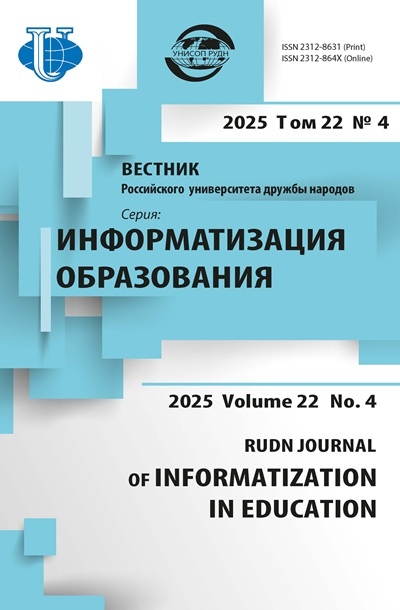Выпуск
Название
Авторы
|
Макотрова Г.В., Файзуллин Р.В. |
|
Самылкина Н.Н., Мишин В.А. |
|
Калмыкова О.В. |
|
Рудинский И.Д., Ли О.Ю. |
|
Гальчук Л.М. |
|
Кузнецов А.А. |
|
Муханова А.А., Муханов С.А., Нижников А.И. |
|
Глизбург В.И. |
|
Салехова Л.Л., Григорьева К.С. |
|
Горюшкин Е.И. |
|
Осиповская Е.А., Лукач Д. |
|
Полушкина А.О. |
|
Сергеев А.Н. |
|
Гарсиа А.С., Силва М.С. |
|
Асланов Р.Э., Большаков А.А., Гриншкун А.В. |
|
Русинов А.С. |
|
Асауленко Е.В. |
|
Гальчук Л.М. |
|
Худолей Н.В. |
|
Ионкина Н.А. |
|
Бубнов В.А., Садыкова А.Р. |
|
Сенашенко Д.В., Сенашенко М.Д. |
|
Гербеков Х.А., Кубекова Б.С., Чанкаева Н.М. |
|
Краснова Г.А. |
|
Томашевская В.С., Рогов И.Е., Старичкова Ю.В., Карачунский А.И., Румянцев С.А. |
|
Чайка Л.В. |
|
Якурнова А.В. |
|
Клековкин Г.А., Орлова Н.Н. |
|
Бочаров М.И. |
|
Лапчик М.П. |
|
Рыбаков Д.С. |
|
Заславская О.Ю., Кравец О.Я. |
|
Симонова И.В., Бочаров М.И. |
|
Левченко И.В. |
|
Снегурова В.И. |
|
Константинян Т.К. |
|
Заславская О.Ю., Филатова Н.И. |
|
Чернышов М.Ю. |
|
Криволапов С.В. |
|
Гальчук Л.М. |
|
Аниканова К.И. |
|
Корнилов В.С. |
|
Заславская О.Ю., Левченко М.С. |
|
Корнилов В.С. |
|
Корнилов В.С. |
|
Корнилов В.С. |
|
Карташова Л.И., Левченко И.В., Павлова А.Е. |
|
Дуйсеева Г.О., Беркимбаев К.М. |
|
Карташова Л.И., Левченко И.В., Павлова А.Е. |
|
Краснова А.А. |
|
Беляева Е.В. |
|
Карташова Л.И., Левченко И.В., Павлова А.Е. |
|
Хадиуллина Р.Р., Чинкин А.С. |
|
Истомин И.П. |
|
Корнилов В.С. |
|
Полушкина Е.А., Краснова Г.А. |
|
Абушкин Д.Б. |
|
Бобина Е.В., Филатова Н.И. |
|
Беркимбаев К.М., Керимбаева Б.Т., Мейрбекова Г.П. |
|
Пушкарева Т.П. |
|
Воробьёв Г.А., Корнев П.А., Малыш В.Н. |
|
Давлеткельдиева А.А., Провоторова Е.А., Матухин П.Г. |
|
Беркимбаев К.М., Мухамеджанов Б.К., Нышанова С.Т., Керимбаева Б.Т. |
|
Гулидова Е.М. |
|
Наговицын Р.С., Алимов Р.Ш. |
|
Корнилов В.С. |
|
Бордачев Д.В. |
|
Жданов А.А. |
|
Белоглазов А.А., Белоглазова Л.Б., Мальков И.М., Антонова Н.А., Алексеева Л.А., Копылова П.А., Новоселова Н.В., Пудовкина С.Д., Белоглазова И.А. |
|
Краснова Г.А. |
|
Шкарбан Ф.В. |
|
Гриншкун В.В., Краснова Г.А. |
|
Гриншкун А.В., Левченко И.В. |
|
Меджидова А.А. |
|
Ромашкова О.Н., Орехова Е.В. |
|
Корнилов В.С. |
|
Сенашенко Д.В., Сенашенко М.А. |
|
Гриншкун В.В., Димов Е.Д. |
|
Бутова В.Н. |
|
Войтович И.К., Костина Н.М., Мельникова О.М. |
|
Усова Н.А. |
|
Корнилов В.С. |
|
Левченко И.В., Карташова L.r. |
|
Левченко И.В. |
|
Абрамова Е.Н. |
|
Корнилов В.С., Беркимбаев К.М., Сапарбекова Г.А. |
|
Неделяева Т.А. |
|
Прошина Е.Ю. |
|
Бутова В.Н. |
|
Цветкова А.В. |
|
Павлова А.Е. |
|
Грибков Д.Н., Деньгина М.Р., Матвеев В.В., Машарова Т.В. |
|
Патаракин Е.Д., Ярмахов Б.Б. |
|
Корнилов В.С., Русинов А.С. |
|
Шеберг К., Рисберг Т., Нури Д., Норен Е., Чжан Л. |
|
Корнилов В.С., Морозова С.В. |
|
Морозова С.В. |
|
Корнилов В.С. |
|
Корнилов В.С. |
|
Исаева П.М. |












